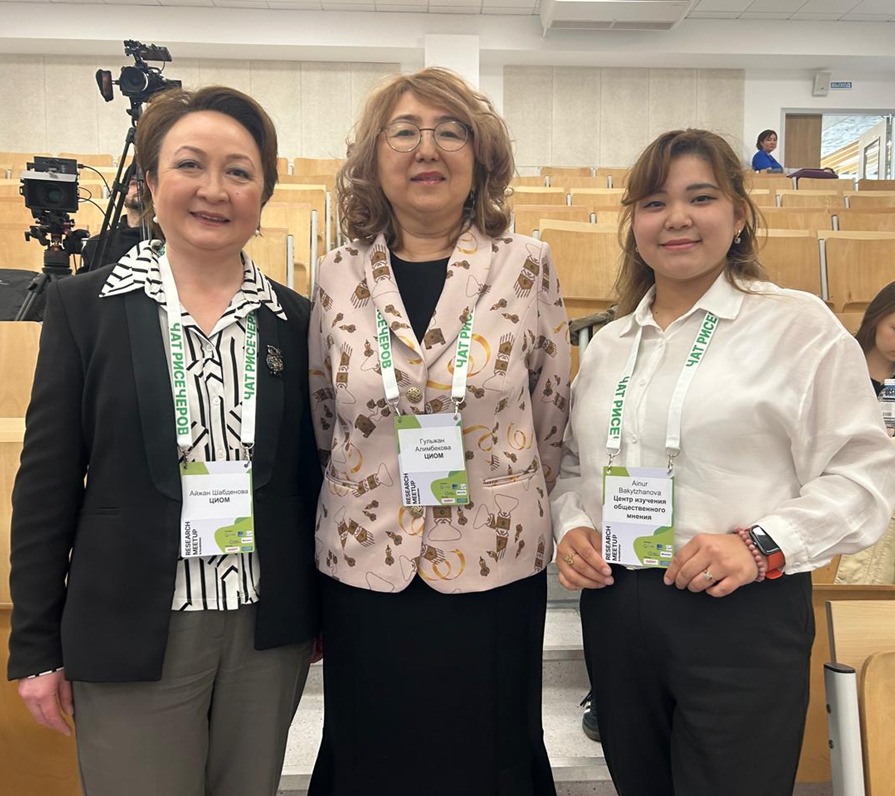CIOM at Research Meetup 2025
CIOM at Research Meetup 2025: An Expert Perspective on the Transformation of the Research Landscape in Kazakhstan
On April 24, 2025, Research Meetup Kazakhstan took place in Almaty at Narxoz University - a significant intellectual platform for sharing data, ideas, and reflections on the current challenges facing the research industry. The Public Opinion Research Center (CIOM) not only participated in the event but also expressed its open support for such formats, recognizing them as essential tools for consolidating the professional community and advancing the level of expert culture in Kazakhstan.
We do not view our participation in Research Meetup as mere formal presence, but rather as a point of professional dialogue and analytical immersion into the key trends, challenges, and prospects of the industry. As a continuation of our engagement, we would like to highlight several presentations that, in our view, raise the most pressing and strategically important questions for the research community. Below is a brief analytical review of selected reports worthy of special attention, both in terms of the data presented and the depth of the issues addressed.
1. The Research Market in Kazakhstan: Growth and Contradictions
The presentation by Natalia Ospanova, President of KAPIOR and Director of Alvin Market Group, offered a comprehensive snapshot of the current state of the research market. According to our observations, the most significant developments are not only the market’s annual growth of 20–30%, but also its structural shifts: the expansion of online methods, the growing share of in-house research, and the strengthening influence of global players.
CIOM emphasizes that this growth is accompanied by paradoxes: on one hand, there is increasing technologization, digitalization, growth of DIY tools, and automation; on the other, the sector continues to face a shortage of skilled professionals, a trust crisis, and pressures from public procurement and dumping. In our view, these processes reflect a phase of incomplete institutional maturity and underscore the need for industry standards, protection of intellectual labor, and the development of sustainable cooperation formats between research and client structures.
2. Everyday Practices of Kazakhstani Consumers: The Importance of Detail and Socio-Cultural Context
The presentation by Elena Simakova clearly demonstrated the value of large-scale tracking studies (particularly MMI 2024) for analyzing not only consumer behavior patterns but also deeper socio-cultural transformations. CIOM stresses that research on consumption, leisure, attitudes toward sports, and harmful habits must be interpreted through the lens of social stratification, regional differences, and rising expectations regarding quality of life.
Example: the decline in sausage consumption and the growing share of drinking yogurts, alongside moderate growth in e-commerce and digital delivery services, are not merely economic indicators they serve as markers of lifestyle changes, infrastructural accessibility, and shifts in values among the younger generation.
3. Kazakh-Speaking Audiences: Language as a Socio-Cultural Marker and Frame of Identity
The study on Kazakh-speaking media audiences deserves separate analytical focus. We consider it especially important to emphasize the need not only to translate content into Kazakh, but to create original materials that are cognitively and emotionally aligned with the audience’s style.
Key insight: in both the media field and research practice, the Kazakh language functions not only as a communication channel, but also as a tool for constructing identity. The fact that a significant portion of youth (aged 16- 24) choose Kazakh in daily life and media consumption highlights the need to consider cultural codes when designing questionnaires, conducting focus groups, and interpreting data.
4. Youth and Artificial Intelligence: Challenges of Sociological Futurism
One of the most conceptually rich presentations was delivered by Alexander Ruzanov (BRIF Research) on how youth perceive AI. Particularly compelling was the application of Fred Polak’s “Images of the Future” model, which serves as a methodological bridge between current expectations, emotional attitudes, and potential scenarios of social transformation.
CIOM sees such approaches as examples of the shift from survey-based to reflexive sociology. These studies do more than register opinion they uncover stable archetypes of future orientation: control, anxiety, optimism, and rejection. Such insights are crucial for developing educational programs, advancing AI ethics, and adapting youth policies to the realities of technological turbulence.
Conclusion
Research Meetup 2025 demonstrated that Kazakhstan’s research community is moving toward maturity, despite structural barriers and challenges. CIOM emphasizes the importance of a strategic perspective on the industry not merely as a market, but as a socio-cultural institution that shapes meaning, trust, and practice.
We are convinced that it is precisely in such dialogical spaces where data, technology, culture, and ethics converge that approaches are born capable of making Kazakhstan’s research industry more sustainable, responsible, and profound. We will continue to participate in and support such platforms, contributing not only our presence but also our expert energy.
CIOM stresses that Kazakhstan’s research sector is undergoing rapid transformation, where critical reflection, the development of professional standards and ethics, and investment in human capital are of particular importance. We observe persistent trends that demand attention: growing interest in local content, the increasing role of the Kazakh language in research, the digitalization of research methods, and the changing expectations of clients and society. In our view, it is now especially important not merely to record data, but to generate analytical meanings capable of influencing strategic decisions in business, science, and public policy. CIOM advocates for deep, evidence-based, and socially responsible research practice as a foundation for the sustainable development of society.

Комментарии
| Имя * | |
| Комментарий * | |
